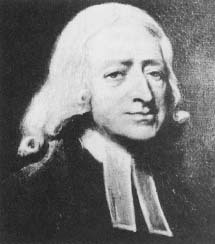John Wesley Trial: 1737
A Fateful Move
In 1735 John and Charles were in London, where they were introduced to James Edward Oglethorpe, who in 1733 had started a colony in America named Georgia. Oglethorpe encouraged the brothers to go to Georgia to preach to the many Christians as well as to the "heathen" Indians, and in December 1735 the brothers set sail with Oglethorpe himself. When their group arrived in Savannah in February 1736, they brought the total colonists to about 650, spread among six settlements. Charles Wesley did not find conditions to his liking and returned to England in July, but John stayed on and tried to impart his more robust form of Christianity to the colonists.
 Painting of John Wesley.
Painting of John Wesley.
One of the first he seems to have tried to convert was a young woman, Sophia Christina Hopkey. Very soon the two seemed to have moved beyond the roles of priest and parishioner; he began to tutor her in French and she tended him when he became ill at one point. As rumors of their relationship spread, one of Wesley's friends asked him if he was intending to marry Sophia. It was reported that, for some reason, he then consulted a group of German Protestants who had their own settlement in Georgia and they—again, for an unknown reason—advised him not to marry her.
Whatever the full story, in March 1737, Sophia married another young colonist, William Williamson. Eight days later, Williamson forbade Sophia to attend the services of Wesley and even to speak with him, but by July at least she did attend a service. Wesley chose to rebuke her in public for several things wrong in her behavior and then early in August actually refused to let her take Communion.
The very next day, Wesley was brought before a bailiff in Savannah to answer to a complaint by William Williamson that his wife Sophia had been defamed. The hearing was set for August 22. The presiding judge was the chief magistrate of the colony, Thomas Causton, but not only was Causton known as an illtempered, virtually despotic man, his wife was an aunt of Sophia Williamson. During these days, Causton openly sided with his niece, at one point even calling on Wesley and demanding that he explain in writing why he had refused Sophia the right to take Communion. Moreover, Causton was alleged to have tried to influence at least some of the members of the grand jury by offering them extra food and provisions.
Additional topics
Law Library - American Law and Legal InformationNotable Trials and Court Cases - 1637 to 1832John Wesley Trial: 1737 - A Fateful Move, The Case Against Wesley, Threats, Flight, And A New Church